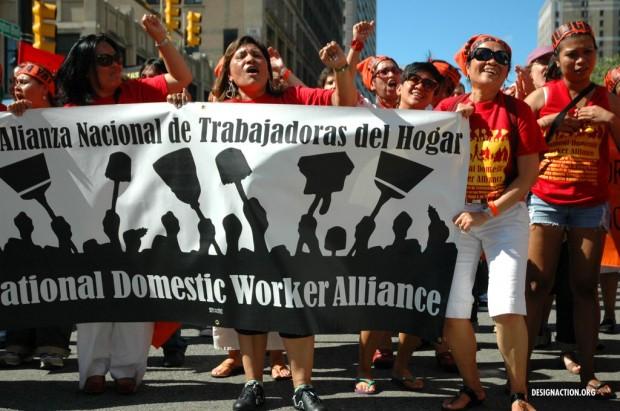States consider reforms to help domestic workers move out of shadows
Domestic workers, many of them female immigrants, are rallying at state capitols across America to urge legislators to pass laws that improve their working conditions. (Photo courtesy of the National Domestic Workers Alliance.)
Myrla Baldonado left the Philippines for Chicago six years ago.
Most of her time here, she cared for elderly people in their homes, attending to their round-the-clock needs. She made their beds, fixed meals and monitored them for symptoms of stroke or illness.
Baldonado worked like this for years — putting in 96-hour weeks — at $4 an hour.
“Like most immigrants, I tried not to pay attention to it,” Baldonado said.
She said that wage was standard, what other caregivers got, too. And she needed a job.
“But then when I started being shouted at and I felt being discriminated for not being an original English speaker, I felt so bad,” she said.
Baldonado recalls how the son of one client bullied her on the job. She asked her staffing agency for help. They told her to be more assertive, so she quit.
Now, Baldonado is an organizer pushing for legislation in Illinois to give other domestic workers in similar situations more firepower, especially newcomers to the U.S. who might not realize their basic rights. Baldonado says it’s hard because people don’t think of domestic workers as workers.
“It’s considered invisible, it’s not real work,” she said. “And it’s women’s work. So there’s so much cultural difficulty into asserting this kind of work.”
Many of the people involved in this movement use the word “invisible” when they describe domestic workers. One reason? Many of them are undocumented immigrants. A survey by the University of Illinois at Chicago found more than a third of domestic workers are here illegally. And of domestic workers, they are the most exploited and abused. Often, they earn less than their peers, are more likely to be injured on the job and less likely to quit or complain.
Ai-jen Poo says they do the work that Americans won’t do.
“We often call it the work that makes all other work possible,” said Poo, director of the National Domestic Workers Alliance, an advocacy group based in New York.
The group helped New York and Hawaii adopt Domestic Workers Bills of Rights. The proposed legislation would give domestic workers the right to overtime pay, paid time off and freedom from sexual harassment.
The bills are designed to protect domestic workers, with or without papers. Poo says that's crucial because federal laws make it difficult for domestic workers to unionize. So those without legal status have the least leverage to negotiate their working conditions.
“Often times, people will get fired for asking for a sick day,” Poo said.
In New York, domestic workers can now file complaints about mistreatment with the state’s labor department.
Other states are considering similar measures. But there are new concerns now that Congress is debating new immigration laws.
So far, the proposals favor immigrants who can prove they have worked continuously in the U.S. They would also have employers tap into a verification system to check a worker’s status. That worries Maureen Purtill, an immigrant organizer with the Graton Day Labor Center in California. She says the proposal ignores cases where the employer’s just a family looking for a nanny. They might not be plugged into a verification system like a big business is.
“So women and families are especially vulnerable to being excluded from the immigration reform process,” she said.
The National Domestic Workers Alliance is lobbying to clarify language in an immigration bill now making its way through the Senate. They want to make sure it gives low-wage domestic workers the chance to achieve legal status.
Meanwhile, Baldonado says organizing her fellow domestic workers is tough. Many have battered self-esteem and fear being reported to immigration officials and deported, but she is noticing more are getting involved–for the same reason she did.
“I don’t want to live that way,” Baldonado said. “I don’t want to just live for the money and not get any respect, or, not get any dignity or respect for the work I’m doing.”
Baldonado is confident that domestic workers won’t be invisible much longer. And there’s good reason to believe that. Baby boomers are aging, and more immigrants are fulfilling the need for home caregivers — now projected to be among the fastest-growing occupations of the decade.
